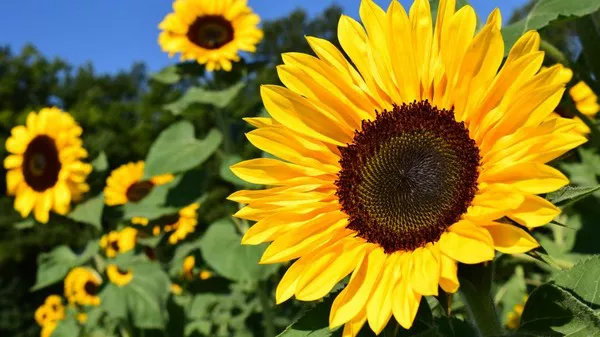Sunflowers (Helianthus annuus) are iconic garden beauties that bring a touch of sunshine to any outdoor space. However, the joy of cultivating these vibrant blooms can often be dampened by the presence of slugs, which can quickly devour your sunflowers and leave a trail of destruction in their wake. In this article, we will explore various methods to deter slugs from feasting on your sunflowers and safeguard your gardening efforts.
Understanding the Slug Threat
Slugs are mollusks that thrive in damp and cool environments, making them particularly troublesome for sunflower enthusiasts. These voracious feeders can damage both young seedlings and mature plants, leaving irregular holes in the leaves and sometimes even devouring the entire plant. Recognizing the signs of slug infestation early is crucial for effective intervention.
Creating an Unfavorable Environment
1. Maintain Dry Surroundings: Slugs prefer moist environments, so reducing excess moisture in your garden can discourage their presence. Avoid over-watering and consider installing irrigation systems that target the base of plants rather than wetting the surrounding soil.
2. Optimize Plant Spacing: Adequate spacing between sunflowers reduces the likelihood of slugs migrating from one plant to another. This prevents them from easily accessing a new food source, making it less appealing for them to linger in your garden.
3. Mulching with Rough Materials: Slugs struggle to move over coarse and abrasive surfaces. Utilize mulching materials like crushed eggshells, diatomaceous earth, or gravel around your sunflowers. This creates a barrier that is challenging for slugs to traverse.
Natural Predators and Biological Controls
1. Encourage Natural Predators: Introducing natural predators to your garden can help maintain a balanced ecosystem. Birds, frogs, toads, and certain beetles are known to feast on slugs. Creating inviting habitats for these creatures, such as birdhouses and water sources, can attract them to your garden.
2. Nematodes: Beneficial nematodes are microscopic worms that can be applied to the soil. They infect and kill slugs while leaving other organisms unharmed. Nematodes are a safe and environmentally friendly option for controlling slug populations.
Barrier Methods
1. Copper Barriers: Slugs are repelled by copper due to a reaction between their mucus and the metal. Placing copper tape or strips around your sunflower beds can create an effective deterrent, forcing slugs to turn away from your plants.
2. Physical Barriers: Surrounding your sunflowers with physical barriers like plastic cups or collars can prevent slugs from directly accessing the plants. Ensure that the barriers are tall enough to discourage climbing and are buried slightly into the soil to prevent slugs from burrowing underneath.
Effective Baiting Techniques
1. Beer Traps: Slugs are attracted to the scent of beer. Sink shallow containers into the soil near your sunflowers and fill them with beer. Slugs will be lured in and eventually drown. Remember to empty and refill the traps regularly.
2. Citrus Traps: Similarly, citrus fruits like orange or grapefruit halves can be used as bait. Place the fruit halves upside down near your sunflowers in the evening. Collect and dispose of the slugs that gather on the fruit the following morning.
Organic Repellents
Natural Repellent Sprays: Various organic sprays can be concocted using ingredients such as garlic, neem oil, and hot pepper. These sprays can be applied to the leaves and stems of sunflowers, creating an unappealing taste for slugs.
Cultural Practices
1. Timely Planting: Opt for early planting to establish sunflowers before the peak slug season. This gives the plants a head start in growth, making them less susceptible to severe slug damage.
2. Regular Inspection: Consistent monitoring of your sunflowers allows you to spot slug damage early and take swift action. Handpicking slugs during evening hours when they are most active can help control their population.
Conclusion
Sunflowers are a cherished addition to gardens, bringing vibrant colors and a touch of nature’s beauty. By understanding the threat slugs pose and implementing a combination of preventive measures, natural predators, barriers, and repellents, you can effectively protect your sunflowers from slug damage. Remember that a multi-faceted approach often yields the best results, ensuring that your gardening efforts are rewarded with healthy and thriving sunflowers.


